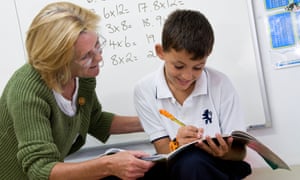 Tests to check whether eight- and nine-year-olds know their times tables will be trialled in some primary schools in England next month before being rolled out nationally.
Tests to check whether eight- and nine-year-olds know their times tables will be trialled in some primary schools in England next month before being rolled out nationally.
The test, which ministers hope will improve pupils’ numeracy, will become mandatory in 2020 for all year 4 students.
The government says the on-screen test, which assesses knowledge of the times tables up to 12, will last no longer than five minutes and has been designed to avoid causing additional stress for children and teachers.
The Department for Education sought to reassure teachers that the results would not be published and would not be used by the schools watchdog Ofsted to enforce any changes.
Many teachers’ leaders remain opposed to the new test, which is being introduced just as Sats tests in maths and English for seven-year-olds are about to be phased out after complaints about the burden of stress on young children and their teachers.
Nick Brook, the deputy general secretary of the National Association of Head Teachers, said: “We’re working constructively with the government on primary assessment generally so it’s hugely disappointing that they are still intent on the introduction of a multiplication tables test, which the NAHT opposes.”
The idea of a multiplication test was first raised in the 2015 Conservative manifesto, and was originally intended for 11-year-olds. The numeracy skills of students in England lag behind those of their peers in east and south-east Asia.
The tests will reinforce the “mastery” approach to maths which is favoured by schools in Shanghai and Singapore and is gradually being introduced in English schools. In the most recent Trends in International Mathematics and Science Study, England’s mean score was 546, compared with Singapore’s 618.
Nick Gibb, the school standards minister, said: “Just as the phonics screening check helps children who are learning to read, the multiplication tables check will help teachers identify those pupils who require extra support.
“This will ensure that all pupils leave primary school knowing their times tables by heart and able to start secondary school with a secure grasp of fundamental arithmetic as a foundation for mathematics.”
Brook said: “This test won’t tell teachers and parents anything they don’t already know about their children. Although school results won’t be published, this government test will be scrutinised by Ofsted when they visit and therefore become even more significant.
“A pupil’s primary school years are already cluttered with tests and checks. We want all children to succeed at school, but the answer isn’t to test them more.”
The tests will be tried out in a sample of schools this spring before being made available on a voluntary basis next year, and then compulsory the following year.
source:-.theguardian.




